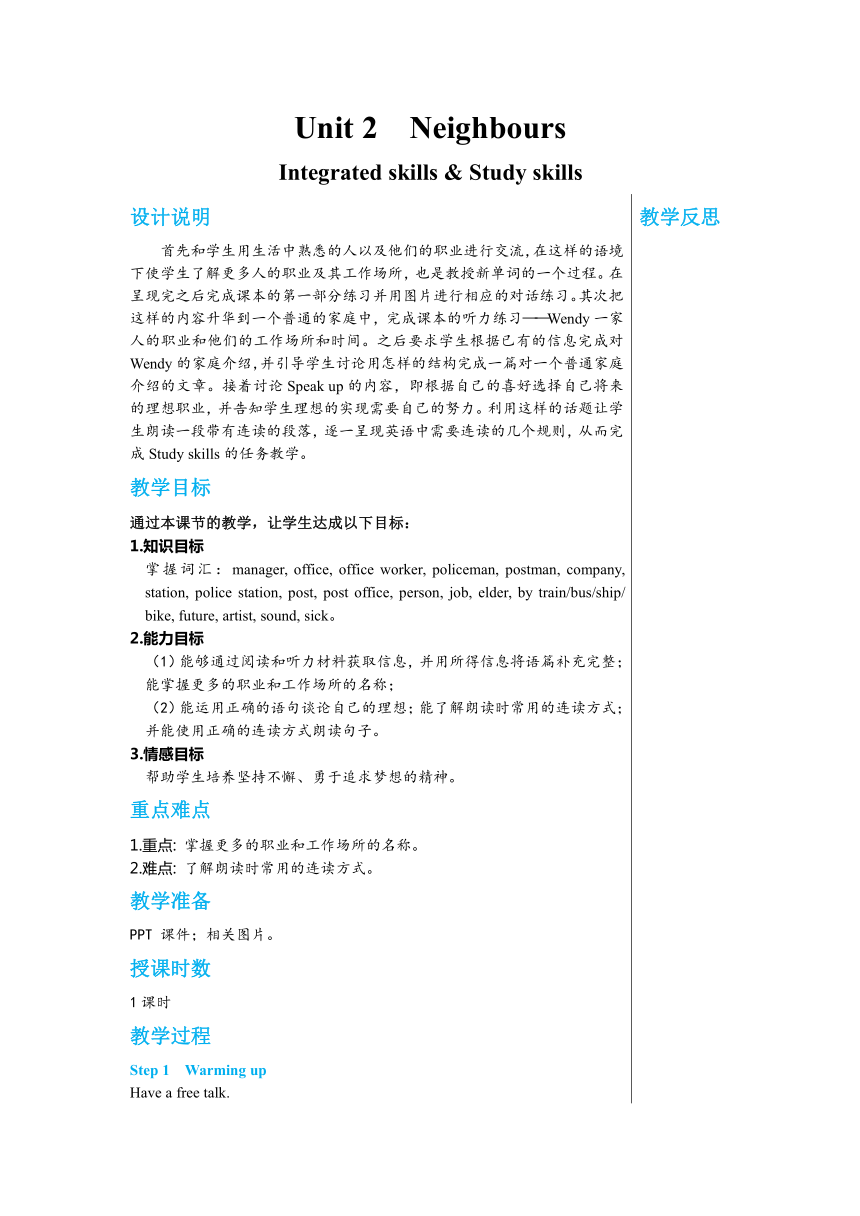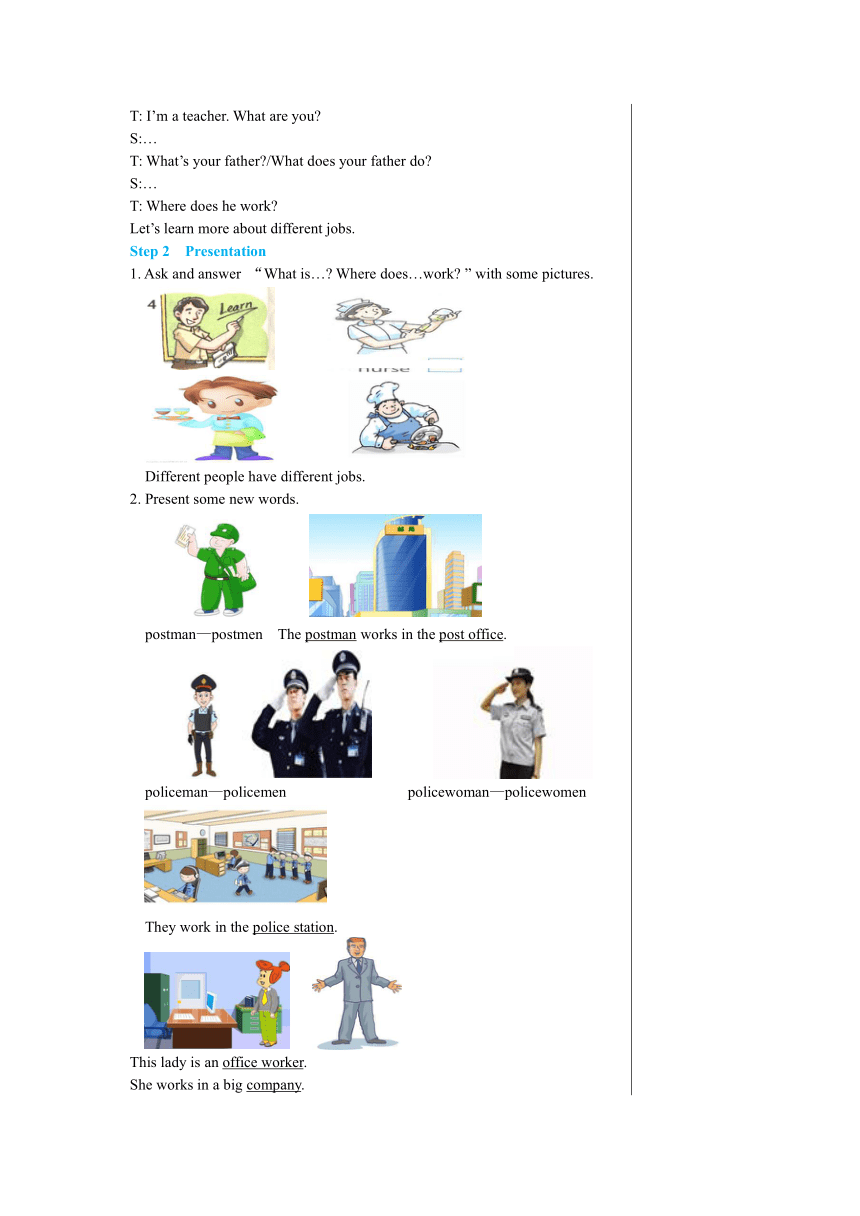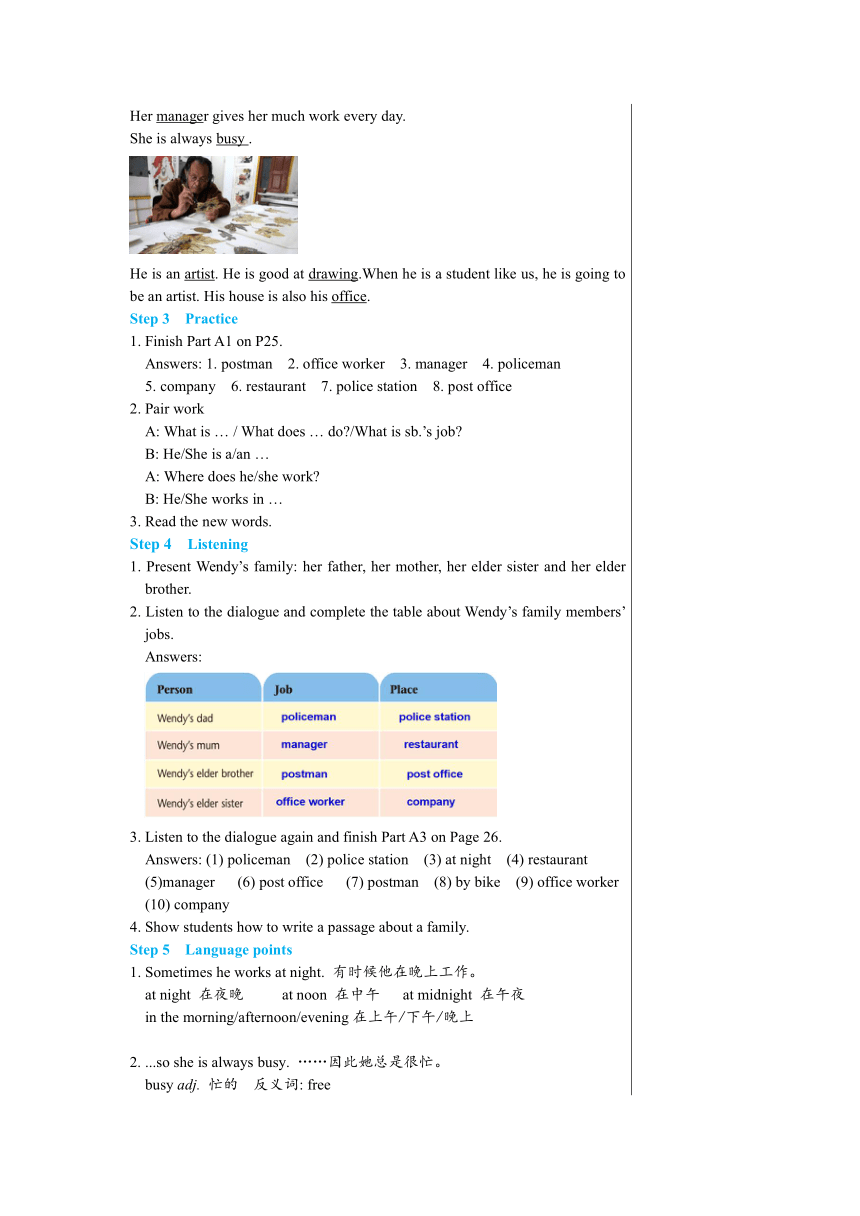Unit 2 Integrated skills & Study skills教学详案-译林牛津版初中英语七年级(下)
文档属性
| 名称 | Unit 2 Integrated skills & Study skills教学详案-译林牛津版初中英语七年级(下) |

|
|
| 格式 | docx | ||
| 文件大小 | 313.4KB | ||
| 资源类型 | 试卷 | ||
| 版本资源 | 牛津译林版 | ||
| 科目 | 英语 | ||
| 更新时间 | 2024-02-21 19:45:06 | ||
图片预览



文档简介
Unit 2 Neighbours
Integrated skills & Study skills
设计说明 首先和学生用生活中熟悉的人以及他们的职业进行交流,在这样的语境下使学生了解更多人的职业及其工作场所,也是教授新单词的一个过程。在呈现完之后完成课本的第一部分练习并用图片进行相应的对话练习。其次把这样的内容升华到一个普通的家庭中,完成课本的听力练习——Wendy一家人的职业和他们的工作场所和时间。之后要求学生根据已有的信息完成对Wendy的家庭介绍,并引导学生讨论用怎样的结构完成一篇对一个普通家庭介绍的文章。接着讨论Speak up的内容,即根据自己的喜好选择自己将来的理想职业,并告知学生理想的实现需要自己的努力。利用这样的话题让学生朗读一段带有连读的段落,逐一呈现英语中需要连读的几个规则,从而完成Study skills的任务教学。 教学目标 通过本课节的教学,让学生达成以下目标: 1.知识目标 掌握词汇:manager, office, office worker, policeman, postman, company, station, police station, post, post office, person, job, elder, by train/bus/ship/ bike, future, artist, sound, sick。 2.能力目标 (1)能够通过阅读和听力材料获取信息,并用所得信息将语篇补充完整;能掌握更多的职业和工作场所的名称; (2)能运用正确的语句谈论自己的理想;能了解朗读时常用的连读方式;并能使用正确的连读方式朗读句子。 3.情感目标 帮助学生培养坚持不懈、勇于追求梦想的精神。 重点难点 1.重点: 掌握更多的职业和工作场所的名称。 2.难点: 了解朗读时常用的连读方式。 教学准备 PPT 课件;相关图片。 授课时数 1课时 教学过程 Step 1 Warming up Have a free talk. T: I’m a teacher. What are you S:… T: What’s your father /What does your father do S:… T: Where does he work Let’s learn more about different jobs. Step 2 Presentation 1. Ask and answer “What is… Where does…work ” with some pictures. Different people have different jobs. 2. Present some new words. postman—postmen The postman works in the post office. policeman—policemen policewoman—policewomen They work in the police station. This lady is an office worker. She works in a big company. Her manager gives her much work every day. She is always busy . He is an artist. He is good at drawing.When he is a student like us, he is going to be an artist. His house is also his office. Step 3 Practice 1. Finish Part A1 on P25. Answers: 1. postman 2. office worker 3. manager 4. policeman 5. company 6. restaurant 7. police station 8. post office 2. Pair work A: What is … / What does … do /What is sb.’s job B: He/She is a/an … A: Where does he/she work B: He/She works in … 3. Read the new words. Step 4 Listening 1. Present Wendy’s family: her father, her mother, her elder sister and her elder brother. 2. Listen to the dialogue and complete the table about Wendy’s family members’ jobs. Answers: 3. Listen to the dialogue again and finish Part A3 on Page 26. Answers: (1) policeman (2) police station (3) at night (4) restaurant (5)manager (6) post office (7) postman (8) by bike (9) office worker (10) company 4. Show students how to write a passage about a family. Step 5 Language points 1. Sometimes he works at night. 有时候他在晚上工作。 at night 在夜晚 at noon 在中午 at midnight 在午夜 in the morning/afternoon/evening在上午/下午/晚上 2. ...so she is always busy. ……因此她总是很忙。 busy adj. 忙的 反义词: free be busy with sth.忙于某事 be busy doing sth.忙于做某事 My mother is always busy with housework. 我妈妈总是忙于家务活。 Now students are busy preparing for the exams. 现在学生在忙于准备考试。 3. She works for a company far away from her home. 她为离她家很远的一家公司工作。 far away from 远离;离……很远,其中away可以省略。 My home is far away from the school. 我家离学校很远。 4. ...so she goes to work by train. ……因此她乘火车去上班。 by train 乘火车 “by+交通工具名词”表示交通方式,意为“乘坐……”。 by后面的交通工具名词用单数形式,且该名词前不加冠词、形容词性物主代词等限定词。 by bus乘公共汽车 by ship乘轮船 by bike骑自行车 by subway乘地铁 【拓展】 “go to... by+交通工具”意为“乘坐……去某地”,可与“go to... on one’s+交通工具”或“take a/the+交通工具+to...”进行同义转换。 She goes to work by train.的同义句: She goes to work on the train./She takes the train to work. Step 6 Speak up 1. Listen and answer: What are they talking about The answer: They are talking about what they are going to be in the future. 2. Discussion: What are they going to be in the future Why Talk about their hobbies, abilities and hopes. WhoWhatWhyDaniela computer engineerHe likes computers.Milliea teacherShe loves school.Sandyan artistShe’s good at drawing.Amya doctorShe wants to help sick people.Simona football player
Tell students: We need effort to make our dream jobs true. 3. Teach students some language points. (1) What are you going to be in the future 你在将来准备做什么? in the future 在将来 用在一般将来时中 (2) I’m sure you’ll be good at it. 我相信你会做得很好。 be sure+(that) 从句(主语是人) We are sure that she will come tomorrow. 我们确信她明天会来的。 【拓展】be sure of对……有把握 I’m sure of that. 我对那件事有把握。 be sure to do sth. 一定做某事 They are sure to come. 他们一定会来的。 (3)That sounds like a good idea. 那听起来是个不错的主意。 sound 连系动词 听起来 后跟形容词作表语。 sound beautiful听起来优美 sound like...听起来像…… It sounds like an interesting book.它听起来像是一本有趣的书。 sound 名词 声音 the sound of ……的声音。 (4)I want to help sick people. 我想帮助生病的人们。 sick 形容词 生病的 可作定语或表语。 help sick people帮助生病的人 (sick作定语) The person is sick. 这个人生病了。(sick作表语) 同义词ill adj.生病的 在句中只能作表语。 4. Read and practise the dialogue in pairs. Step 7 Study skills 1. Have a try: Read loudly. My teacher asked me, “What do you want to be ” I told him what I thought. I said,“An astronaut! I want to walk on Mars. And look at all the stars!” 连读 在连贯地说话或朗读时, 在同一个意群(即短语或从句)中, 假如相邻的两个词前者以辅音音素结尾, 后者以元音音素开头, 就要当然地将辅音和元音相拼, 造成一个音节, 这就是连读。 2. Present the rules: 规则一:辅+元 an apple /n / stand up /d / in an hour /n / /na / We usually link a consonant sound (辅音) with a vowel sound (元音). 前一个词以辅音结尾,后一个词以元音开头,就要将辅音与元音拼起来读。 Dictation cold ice big orange an egg an umbrella turn on get up 规则二:-r(e)+元 there are /ra:/ for us /r / here is /r / When the first word ends in –r or –re and the next word begins with a vowel sound, we join them together with a /r/ sound between them. 前一个词以“r”或者“re”结尾,后一个词以元音开头,就要用/r/连接这两个词。 Dictation there is here are far away four of us more or less over again 规则三:元+元 we enjoy /j/ go out /w/ the other /j/ When there are two vowel sounds, we join them as if there were a /j/ or a /w/ sound between them. 前一个词以元音结尾,后一个词也以元音开头,连接它们时就好像在中间增加了一个半元音/j/或/w/。 Dictation high up the area three exercises go in no other two oranges 不完全爆破 (一)什么是不完全爆破 在朗读句子或某些单词时,爆破音/p/,/b/,/t/,/d/,/k/, /g/在一定情况下不必爆破出来,就是说气流不必冲破阻碍,而只是发音器官在口腔中形成阻碍,稍作停顿后马上过渡到后面的音,这种现象叫不完全爆破。下面“( )”部分不必读出来。 (二)不完全爆破的详细状况 (1) /p/, /b/, /t/, /d/, /k/, /g/这6个爆破音中的任何两个音素相邻时,前者发不完全爆破音,后者则要完全地彻底地进行爆破。如: a bi(g) bus wha(t) time a re(d) coat (2)爆破音/p/, /b/, /t/, /d/, /k/, /g/在/m/, /n/, /l/, /s/的前面时不完全爆破。如: Goo(d) morning, sir. Goo(d) night. 规则四: 辅+辅 best time sit down a big cake When two consonant sounds of two words meet, we sometimes do not need to pronounce the first consonant sound. 前一个词以辅音结尾,后一个词也以辅音开头,有时不用读出前一个词末尾的辅音。 Dictation next team cold drink keep busy white cat best doctor hard time Step 8 Homework 1. Remember the new words of different jobs and places and the language points in this lesson. 2. Make a speech about your dream job (what, why, how). 3. Listen and practise saying the words again. 4. Review the rules of linking sounds. 5. Preview the next lesson. 当堂达标 Ⅰ. 单项选择 1. Daniel and his parents a day out. A. is planing B. are planing C. is planning D. are planning 2. He a train to Nanjing next weekend. A. takes B. will take C. took D. take 3. Peter doesn’t live near his school, he has to go to school by bus. A. so B. and C. but D. or 4. —3D printing could be used to build a house in less than 24 hours. —It amazing. It’s my first time to get to know this. A. sounds B. smells C. tastes D. looks 5. —Why not ask Daniel to join us in the trip —I can’t tell if he’s able to. He’s always with his work. A. careful B. familiar C. free D. busy Ⅱ. 根据句意用所给单词的适当形式填空 1. — Are there two new (company) near our home — Yes, there are. 2. The social workers will be happy (give) you some ideas. 3. There are different (skill) for us to learn in the school. 4. ―What are you doing —We (plan) a birthday party for Daniel. 5. — There is something wrong with my computer. —OK. I (ask) my uncle to help you. 6. Every year, a great number of (policeman) work hard to provide us with safety. 7. My father is an (office) in the government. 8. My sister is good at (play) the piano. 9. My mum is busy (cook) in the kitchen. 10. We are (interest) in this kind of computer game. Answers:Ⅰ. 1—5 DBAAD Ⅱ. 1. companies 2. to give 3. skills 4. are planning 5. will ask 6. policemen 7. officer 8. playing 9. cooking 10. interested 板书设计 Unit 2 Neighbours Integrated skills & Study skillsmanager office office worker policeman postman station police station post post office person job elder by train/bus/ship/bike future artist sound sickat night at noon at midnight in the morning/afternoon/evening be busy with sth. be busy doing sth. go to work by train = go to work on the train = take the train to work in the future be sure+(that) sound like...
教学反思
Integrated skills & Study skills
设计说明 首先和学生用生活中熟悉的人以及他们的职业进行交流,在这样的语境下使学生了解更多人的职业及其工作场所,也是教授新单词的一个过程。在呈现完之后完成课本的第一部分练习并用图片进行相应的对话练习。其次把这样的内容升华到一个普通的家庭中,完成课本的听力练习——Wendy一家人的职业和他们的工作场所和时间。之后要求学生根据已有的信息完成对Wendy的家庭介绍,并引导学生讨论用怎样的结构完成一篇对一个普通家庭介绍的文章。接着讨论Speak up的内容,即根据自己的喜好选择自己将来的理想职业,并告知学生理想的实现需要自己的努力。利用这样的话题让学生朗读一段带有连读的段落,逐一呈现英语中需要连读的几个规则,从而完成Study skills的任务教学。 教学目标 通过本课节的教学,让学生达成以下目标: 1.知识目标 掌握词汇:manager, office, office worker, policeman, postman, company, station, police station, post, post office, person, job, elder, by train/bus/ship/ bike, future, artist, sound, sick。 2.能力目标 (1)能够通过阅读和听力材料获取信息,并用所得信息将语篇补充完整;能掌握更多的职业和工作场所的名称; (2)能运用正确的语句谈论自己的理想;能了解朗读时常用的连读方式;并能使用正确的连读方式朗读句子。 3.情感目标 帮助学生培养坚持不懈、勇于追求梦想的精神。 重点难点 1.重点: 掌握更多的职业和工作场所的名称。 2.难点: 了解朗读时常用的连读方式。 教学准备 PPT 课件;相关图片。 授课时数 1课时 教学过程 Step 1 Warming up Have a free talk. T: I’m a teacher. What are you S:… T: What’s your father /What does your father do S:… T: Where does he work Let’s learn more about different jobs. Step 2 Presentation 1. Ask and answer “What is… Where does…work ” with some pictures. Different people have different jobs. 2. Present some new words. postman—postmen The postman works in the post office. policeman—policemen policewoman—policewomen They work in the police station. This lady is an office worker. She works in a big company. Her manager gives her much work every day. She is always busy . He is an artist. He is good at drawing.When he is a student like us, he is going to be an artist. His house is also his office. Step 3 Practice 1. Finish Part A1 on P25. Answers: 1. postman 2. office worker 3. manager 4. policeman 5. company 6. restaurant 7. police station 8. post office 2. Pair work A: What is … / What does … do /What is sb.’s job B: He/She is a/an … A: Where does he/she work B: He/She works in … 3. Read the new words. Step 4 Listening 1. Present Wendy’s family: her father, her mother, her elder sister and her elder brother. 2. Listen to the dialogue and complete the table about Wendy’s family members’ jobs. Answers: 3. Listen to the dialogue again and finish Part A3 on Page 26. Answers: (1) policeman (2) police station (3) at night (4) restaurant (5)manager (6) post office (7) postman (8) by bike (9) office worker (10) company 4. Show students how to write a passage about a family. Step 5 Language points 1. Sometimes he works at night. 有时候他在晚上工作。 at night 在夜晚 at noon 在中午 at midnight 在午夜 in the morning/afternoon/evening在上午/下午/晚上 2. ...so she is always busy. ……因此她总是很忙。 busy adj. 忙的 反义词: free be busy with sth.忙于某事 be busy doing sth.忙于做某事 My mother is always busy with housework. 我妈妈总是忙于家务活。 Now students are busy preparing for the exams. 现在学生在忙于准备考试。 3. She works for a company far away from her home. 她为离她家很远的一家公司工作。 far away from 远离;离……很远,其中away可以省略。 My home is far away from the school. 我家离学校很远。 4. ...so she goes to work by train. ……因此她乘火车去上班。 by train 乘火车 “by+交通工具名词”表示交通方式,意为“乘坐……”。 by后面的交通工具名词用单数形式,且该名词前不加冠词、形容词性物主代词等限定词。 by bus乘公共汽车 by ship乘轮船 by bike骑自行车 by subway乘地铁 【拓展】 “go to... by+交通工具”意为“乘坐……去某地”,可与“go to... on one’s+交通工具”或“take a/the+交通工具+to...”进行同义转换。 She goes to work by train.的同义句: She goes to work on the train./She takes the train to work. Step 6 Speak up 1. Listen and answer: What are they talking about The answer: They are talking about what they are going to be in the future. 2. Discussion: What are they going to be in the future Why Talk about their hobbies, abilities and hopes. WhoWhatWhyDaniela computer engineerHe likes computers.Milliea teacherShe loves school.Sandyan artistShe’s good at drawing.Amya doctorShe wants to help sick people.Simona football player
Tell students: We need effort to make our dream jobs true. 3. Teach students some language points. (1) What are you going to be in the future 你在将来准备做什么? in the future 在将来 用在一般将来时中 (2) I’m sure you’ll be good at it. 我相信你会做得很好。 be sure+(that) 从句(主语是人) We are sure that she will come tomorrow. 我们确信她明天会来的。 【拓展】be sure of对……有把握 I’m sure of that. 我对那件事有把握。 be sure to do sth. 一定做某事 They are sure to come. 他们一定会来的。 (3)That sounds like a good idea. 那听起来是个不错的主意。 sound 连系动词 听起来 后跟形容词作表语。 sound beautiful听起来优美 sound like...听起来像…… It sounds like an interesting book.它听起来像是一本有趣的书。 sound 名词 声音 the sound of ……的声音。 (4)I want to help sick people. 我想帮助生病的人们。 sick 形容词 生病的 可作定语或表语。 help sick people帮助生病的人 (sick作定语) The person is sick. 这个人生病了。(sick作表语) 同义词ill adj.生病的 在句中只能作表语。 4. Read and practise the dialogue in pairs. Step 7 Study skills 1. Have a try: Read loudly. My teacher asked me, “What do you want to be ” I told him what I thought. I said,“An astronaut! I want to walk on Mars. And look at all the stars!” 连读 在连贯地说话或朗读时, 在同一个意群(即短语或从句)中, 假如相邻的两个词前者以辅音音素结尾, 后者以元音音素开头, 就要当然地将辅音和元音相拼, 造成一个音节, 这就是连读。 2. Present the rules: 规则一:辅+元 an apple /n / stand up /d / in an hour /n / /na / We usually link a consonant sound (辅音) with a vowel sound (元音). 前一个词以辅音结尾,后一个词以元音开头,就要将辅音与元音拼起来读。 Dictation cold ice big orange an egg an umbrella turn on get up 规则二:-r(e)+元 there are /ra:/ for us /r / here is /r / When the first word ends in –r or –re and the next word begins with a vowel sound, we join them together with a /r/ sound between them. 前一个词以“r”或者“re”结尾,后一个词以元音开头,就要用/r/连接这两个词。 Dictation there is here are far away four of us more or less over again 规则三:元+元 we enjoy /j/ go out /w/ the other /j/ When there are two vowel sounds, we join them as if there were a /j/ or a /w/ sound between them. 前一个词以元音结尾,后一个词也以元音开头,连接它们时就好像在中间增加了一个半元音/j/或/w/。 Dictation high up the area three exercises go in no other two oranges 不完全爆破 (一)什么是不完全爆破 在朗读句子或某些单词时,爆破音/p/,/b/,/t/,/d/,/k/, /g/在一定情况下不必爆破出来,就是说气流不必冲破阻碍,而只是发音器官在口腔中形成阻碍,稍作停顿后马上过渡到后面的音,这种现象叫不完全爆破。下面“( )”部分不必读出来。 (二)不完全爆破的详细状况 (1) /p/, /b/, /t/, /d/, /k/, /g/这6个爆破音中的任何两个音素相邻时,前者发不完全爆破音,后者则要完全地彻底地进行爆破。如: a bi(g) bus wha(t) time a re(d) coat (2)爆破音/p/, /b/, /t/, /d/, /k/, /g/在/m/, /n/, /l/, /s/的前面时不完全爆破。如: Goo(d) morning, sir. Goo(d) night. 规则四: 辅+辅 best time sit down a big cake When two consonant sounds of two words meet, we sometimes do not need to pronounce the first consonant sound. 前一个词以辅音结尾,后一个词也以辅音开头,有时不用读出前一个词末尾的辅音。 Dictation next team cold drink keep busy white cat best doctor hard time Step 8 Homework 1. Remember the new words of different jobs and places and the language points in this lesson. 2. Make a speech about your dream job (what, why, how). 3. Listen and practise saying the words again. 4. Review the rules of linking sounds. 5. Preview the next lesson. 当堂达标 Ⅰ. 单项选择 1. Daniel and his parents a day out. A. is planing B. are planing C. is planning D. are planning 2. He a train to Nanjing next weekend. A. takes B. will take C. took D. take 3. Peter doesn’t live near his school, he has to go to school by bus. A. so B. and C. but D. or 4. —3D printing could be used to build a house in less than 24 hours. —It amazing. It’s my first time to get to know this. A. sounds B. smells C. tastes D. looks 5. —Why not ask Daniel to join us in the trip —I can’t tell if he’s able to. He’s always with his work. A. careful B. familiar C. free D. busy Ⅱ. 根据句意用所给单词的适当形式填空 1. — Are there two new (company) near our home — Yes, there are. 2. The social workers will be happy (give) you some ideas. 3. There are different (skill) for us to learn in the school. 4. ―What are you doing —We (plan) a birthday party for Daniel. 5. — There is something wrong with my computer. —OK. I (ask) my uncle to help you. 6. Every year, a great number of (policeman) work hard to provide us with safety. 7. My father is an (office) in the government. 8. My sister is good at (play) the piano. 9. My mum is busy (cook) in the kitchen. 10. We are (interest) in this kind of computer game. Answers:Ⅰ. 1—5 DBAAD Ⅱ. 1. companies 2. to give 3. skills 4. are planning 5. will ask 6. policemen 7. officer 8. playing 9. cooking 10. interested 板书设计 Unit 2 Neighbours Integrated skills & Study skillsmanager office office worker policeman postman station police station post post office person job elder by train/bus/ship/bike future artist sound sickat night at noon at midnight in the morning/afternoon/evening be busy with sth. be busy doing sth. go to work by train = go to work on the train = take the train to work in the future be sure+(that) sound like...
教学反思
